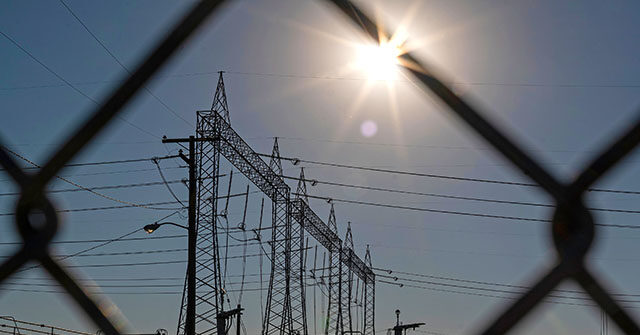Key reforms to federal energy regulations are needed to meet the United States’ growing natural gas and electricity demands as outdated red tape is “masquerading as oversight,” the ALFA Institute said in a new report.
The Federal Energy Regulatory Commission (FERC), an agency under the Department of Energy that approves energy infrastructure projects, has an underutilized program that could “immediately and dramatically jumpstart our needed grid infrastructure” if it is updated, the technology policy group stated in its recent findings, obtained by Breitbart News.
While experts expect U.S. electricity demand to grow by about 25 percent by 2030, with it jumping to around 50 percent by 2050 — due in large part to AI — the energy grid has yet to reach the capability to support that.
Despite the growing electricity demand, the North American Electric Reliability Corporation (NERC) warned in December 2024 that over 122,000 megawatts of dispatchable capacity are set to retire, with ALFA pointing to previous Environmental Protection Agency (EPA) “rulemakings, tax credit favoritism, and weaponized state environmental activism, which forced coal and gas retirements without ensuring replacement capacity to keep the lights on.”
Those policy decisions were being made even as peak load is expected to grow by 149 gigawatts in winter alone in the next 10 years, making for future “blackouts, price spikes, and industrial decline,” according to the report.
ALFA went on to highlight a “critical tool” that FERC uses to streamline interstate natural gas pipeline companies’ routine projects under a certain dollar amount rather than make them wait in bureaucratic limbo — but the program has not been updated to keep up with today’s construction costs.
The FERC Blanket Certificate Program allows for fast-tracked approvals of certain routine activities such as construction, modification, acquisition, operation, or abandonment without applying for a full, case-specific certificate for each project — but it is “shackled by long-outdated cost caps and narrow requirements” written in the 1980s, the report stated.
The program has two tracks, both with price caps that do not reflect the current project rates within the industry:
Automatic Authorization, which is used for minor and routine activities. To qualify for automatic authorization, the project needs to cost less than $14.5 million. Projects that qualify for Automatic Authorization do not require any public announcement and can begin work immediately.
Prior Notice Authorization, which is used for slightly larger projects that may affect third parties. To qualify for prior notice authorization, the project needs to cost less than $41 million. Projects under “prior notice” are subject to a brief public notice period, but if no substantive objections are raised, the project may proceed within 45–60 days.
While the average per-mile cost of pipeline construction has risen by a staggering 268 percent since 2006, FERC’s prior notice cost threshold has only risen by 50 percent. A recent review by the institute revealed that nearly 40 percent of natural gas projects filed since 2020 could have qualified for a prior notice authorization if the Blanket Certificate Program’s price cap had kept pace with construction costs — leading to delays of a year or more on average.
The disconnect between the price caps and the real-world costs means otherwise qualifying projects are being forced into a full-scale review process.
“This is red tape masquerading as oversight,” the report argues.
Noting that the prior notice cost cap was temporarily increased last year from $41.1 million to $61.65 million and that FERC initiated a Notice of Inquiry to consider making that raise permanent, ALFA said that is a “good start, but the cost cap across the entire Blanket Certificate Program should be re-evaluated.”
The automatic authorization cap should be raised from $14.5 million to $50 million, and the prior notice cap should be raised from $41 million to $100 million, the institute argued, noting that the action can be pursued via a shortened notice-and-comment rulemaking process.
Besides raising cost caps, ALFA added that the blanket program’s scope also needs to be expanded to fit “common, low-risk” projects that are not eligible for quick approval:
The Blanket Certificate Program was built to streamline approvals for natural gas projects that are low-impact and urgently needed. That purpose hasn’t changed. But the way we define eligibility hasn’t kept up with the infrastructure America actually needs. Most new infrastructure doesn’t require carving new paths across the country, instead, it involves upgrading or expanding within these existing corridors, which already have the environmental clearance, landowner agreements, and operational history needed to move quickly and responsibly. Projects built within these corridors, using the same footprint or modest in scale, should not be treated the same as brand-new builds in undeveloped areas. These upgrades are common, low-risk, and essential to meeting rising energy demand. Yet FERC’s current rules, including the arbitrary cost caps and outdated eligibility standards, don’t reflect this reality. For example, while there’s no cost cap for adding new delivery points, there is one for receipt points, even though both have similar impact and are critical to system flexibility. That’s a policy inconsistency we can’t afford, especially as gas flows shift and LNG plays a bigger role in our energy strategy.
Blaming the Biden administration’s “failed” energy policy for the current national energy emergency announced by Trump in January, ALFA said FERC “has the potential to play a pivotal role in building for America’s future” if the aforementioned “common sense” changes are made.
“FERC must act now to fix these rules. When capital, demand, and landowner support align, Washington shouldn’t stand in the way. The energy emergency we face was created by four years of failed Biden-era energy policy. While Americans endured blackouts and high bills, regulators blocked the very projects needed to keep the lights on. It’s time to right those wrongs with urgency and common sense,” ALFA concluded.
Olivia Rondeau is a politics reporter for Breitbart News based in Washington, DC. Find her on X/Twitter and Instagram.
Read the full article here


